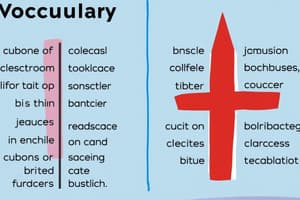Podcast
Questions and Answers
Which expression is typically used in British English to mean 'to attempt something'?
Which expression is typically used in British English to mean 'to attempt something'?
- Take a shot
- Make an effort
- Have a go (correct)
- Give it a try
The idiom 'it's raining men' is commonly used in British English.
The idiom 'it's raining men' is commonly used in British English.
False (B)
What are colloquialisms?
What are colloquialisms?
Informal words or expressions used in everyday speech.
In British English, the slang term 'cheers' is commonly used to mean ______.
In British English, the slang term 'cheers' is commonly used to mean ______.
Match the following idioms to their respective regions:
Match the following idioms to their respective regions:
Which cultural aspect can significantly affect language usage between British and American English?
Which cultural aspect can significantly affect language usage between British and American English?
Cultural references play no role in understanding British and American English.
Cultural references play no role in understanding British and American English.
Why is adaptability important for global communication?
Why is adaptability important for global communication?
Which spelling variation is favored in American English?
Which spelling variation is favored in American English?
In British English, 'pants' refers to what Americans call 'trousers'.
In British English, 'pants' refers to what Americans call 'trousers'.
What term does British English prefer for the American 'elevator'?
What term does British English prefer for the American 'elevator'?
Americans say 'sidewalk' while the British use the term __________.
Americans say 'sidewalk' while the British use the term __________.
Which of the following past tense forms is used in American English?
Which of the following past tense forms is used in American English?
Match the term with its correct definition:
Match the term with its correct definition:
In American English, 'aubergine' is the term used for what is called 'eggplant' in the UK.
In American English, 'aubergine' is the term used for what is called 'eggplant' in the UK.
British English uses 'at the weekend', while American English uses __________.
British English uses 'at the weekend', while American English uses __________.
Flashcards are hidden until you start studying
Study Notes
Introduction: The Diversity of the English Language
- The English language has evolved differently in parts of the world, leading to distinct dialects and variations between American and British English.
- This includes spelling, vocabulary, grammar, pronunciation, and cultural references.
Spelling Variations
- British English uses the '-our' ending in words like 'colour' and 'flavour'.
- American English uses the '-or' ending in words like 'color' and 'flavor'.
- British English uses an 's' in words like 'realise' and 'organise'.
- American English uses a 'z' in those words like 'realize' and 'organize'.
Vocabulary Differences
- American English uses 'elevator' while British English prefers 'lift'.
- In the US, 'pants' refers to what the British call 'trousers'.
- Americans say 'sidewalk' while the British use the term 'pavement'.
- The vegetable is called 'eggplant' in the US and 'aubergine' in the UK.
Grammatical Differences
- British English often uses collective nouns with singular verbs, while American English tends to use plural verbs.
- Some irregular verbs have different past tense forms, such as 'learnt' vs 'learned' or 'spilt' vs 'spilled'.
- Differences in preposition usage can be seen in phrases like 'at the weekend' (British) vs 'on the weekend' (American).
Pronunciation Differences
- British English often drops the 'r' sound in words like 'car' and 'idea', while American English typically pronounces the 'r'.
- Differences in vowel sounds can be heard in words like 'schedule' (British 'shed-yool', American 'sked-yool').
- Regional accents and dialects can significantly impact the pronunciation of words in both British and American English.
Idioms and Expressions
- Familiar phrases such as 'have a go' (British) and 'take a shot' (American) reflect cultural differences.
- Slang and colloquialisms such as 'cheers' (British) and 'thanks' (American) are common in everyday speech.
- Metaphors and idioms, like 'raining cats and dogs' (British) and 'it's raining men' (American), vary between the two dialects.
Cultural References and Humor
- References to television shows, movies, and celebrities can differ between British and American contexts.
- Differences in social customs, etiquette, and cultural perspectives can impact the way language is used and understood.
- Humor and comedic timing may also vary based on cultural norms and shared experiences.
Implications for Global Communication
- Awareness of the linguistic and cultural distinctions between English and American English is crucial for effective global communication.
- Individuals and organizations must be adaptable, understanding the nuances of each dialect to ensure clear and successful interactions.
- Celebrating the diversity of the English language, rather than viewing it as a barrier, can foster greater cross-cultural understanding and collaboration.
Studying That Suits You
Use AI to generate personalized quizzes and flashcards to suit your learning preferences.




